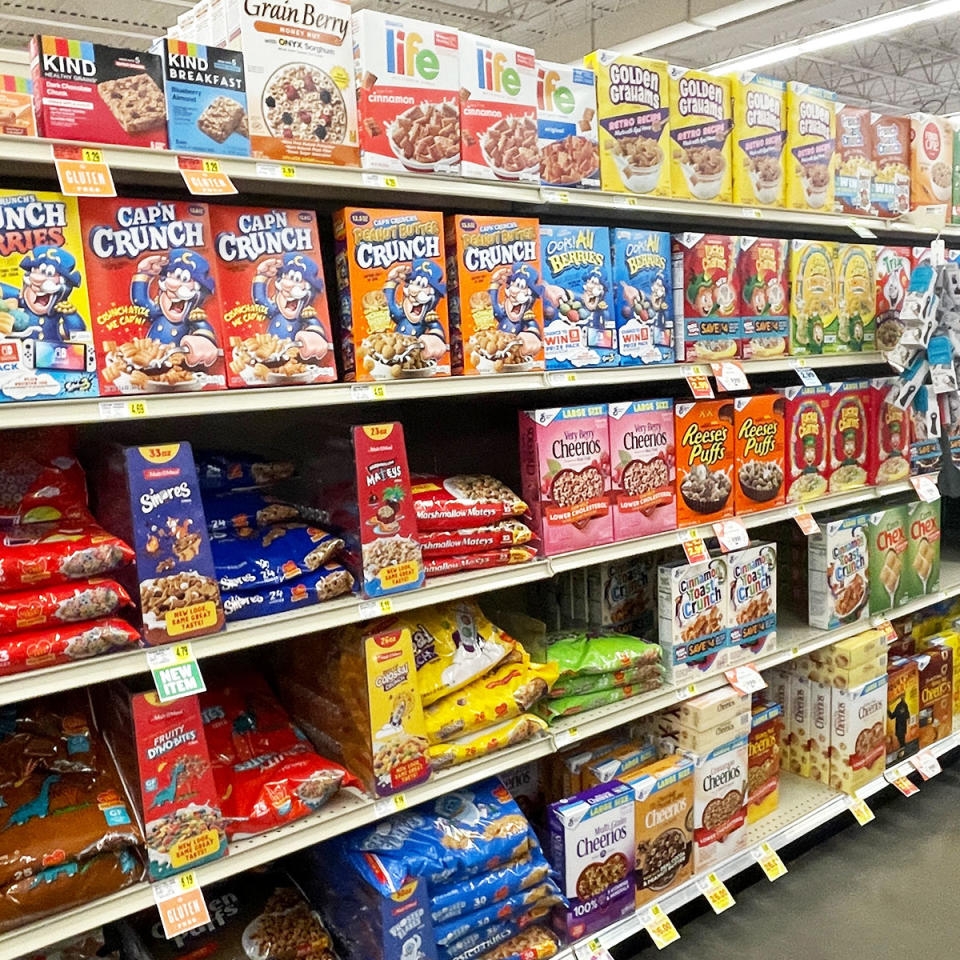The One High-Sugar Food No One Over 40 Should Be Eating Anymore Because It Ruins Your Metabolism
sugar box aisle in grocery store
Ah, sugar—our taste buds can’t get enough of it, but our bodies are better off without it. Although there’s no denying the joy of treating yourself to a bit of sweetness every now and then, consuming too much sugar on a regular basis can put your overall health at risk and should be avoided as much as possible if you’re looking to lose weight and/or maintain a healthy metabolism. And while processed, sugary foods are never a great idea, they can be especially detrimental to your health if you eat them for breakfast, as they typically lack the fuel your body needs to take on the day and will lead to blood sugar spikes later on. In fact, there’s one sugary breakfast food that health experts warn you should avoid at all costs: breakfast cereal.
To learn more about the health risks of regularly chowing down on sugary cereal, we spoke to health experts Dana Hunnes, PhD, dietitian and author of Recipe For Survival, and Varsha Khatri, nutritional therapist from Illuminated Health. They broke down the downsides to this deviously delicious meal, from blood sugar spikes to a slowed metabolism. Find it all below!
Breakfast cereal
Few breakfasts are as quick and convenient (and tasty) as a bowl of cereal. Who could possibly turn down a bowl of sugary goodness that takes seconds to pour? Unfortunately, though, if you’re trying to lose weight (or just keep your overall health in check), kicking your cereal habit may be necessary. Hunnes tells us that “things like Fruit Loops, Cocoa Puffs, and Frosted Flakes” are “made with little (if any) whole grains, and have a lot of added sugars in them,” making them a terrible choice for breakfast.
Khati concurs, noting that “cereals are one of the most high-sugar foods.” And if you think you’re off the hook by choosing boxes that seem healthier or are labeled as low-sugar, you may be wrong. “Even cereals that are supposedly ‘low-sugar’ are in fact high in added sweeteners,” she warns. Say it ain’t so!
Story continues
So, what are the dangers of eating a high-sugar breakfast food like cereal? For one, your blood sugar will likely spike, which will lead to increased sugar cravings later in the day. Khatri explains this: “When you start your day with anything that is high in sugar/sweetener, you are more likely to crave sugar or other sweet foods throughout the day, which means you are more likely to snack just to maintain blood sugar levels.” We all know that processed sugar is no good for your overall health—and it’s especially bad if you want to shed a few pounds.
READ MORE:
3 High-Sugar Foods Dietitians Say You Should Avoid Because They Lead To Inflammation And Weight Gain
Dietitians Say These High-Sugar Foods May Be Why You Struggle To Lose Weight
In addition to these blood sugar spikes, cravings, and overeating, processed foods like cereal also provide your body with very little nutritional value while packing in the calories. Since cereal offers virtually no fiber or protein, your body “barely burns any calories” when you digest them, which can take a serious toll on your metabolism over time. Plus, that lack of satiation will just further exacerbate the issue of cravings and overeating. Overall, it’s a nightmare for anyone trying to slim down and stay fit.
If you’re really in a rush and must opt for a quick cereal, choosing varieties that offer a good amount of whole grains and fiber is always your best bet. In fact, making your own naturally-sweetened granola that you can have on hand for those fast-paced mornings is one great way to stay in control of what’s going into your body. While it may take a bit more initial effort than throwing a box of cereal into your cart at the grocery store, it will be well worth it in the end!
READ MORE:
The Banana Oats Recipe Dietitians Swear By For Gut Health And Immunity
3 Breakfast Foods That Dietitians Say Will Increase Your Metabolic Rate
No Byline Policy
Editorial Guidelines
Corrections Policy
Source

